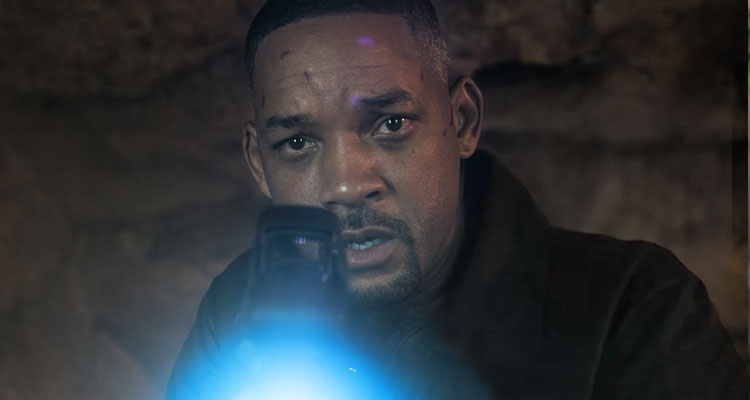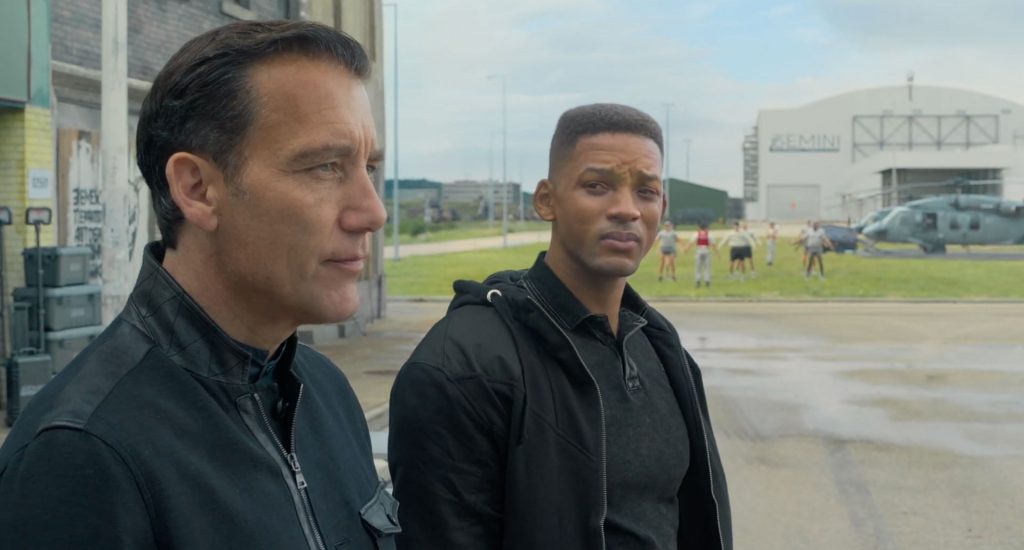Gemini Man (3D) – Film Review
Reviewed by Damien Straker on the 14th of October 2019
Paramount Pictures presents a film by Ang Lee
Produced by Jerry Bruckheimer, David Ellison, Dana Goldberg, and Don Granger
Screenplay by David Benioff, Billy Ray, and Darren Lemke
Starring Will Smith, Mary Elizabeth Winstead, Clive Owen, and Benedict Wong
Music by Lorne Balfe
Cinematography Dion Beebe
Edited by Tim Squyres
Rating: M
Running Time: 118 minutes
Release Date: the 10th of October 2019
The most pressing question surrounding Gemini Man, a generic 3D action movie, involves its production not its mediocre story. What possessed director Ang Lee to film such third-rate material is fascinating. Lee is one of the most versatile filmmakers in the game. His revisionist Western, Brokeback Mountain (2005), is his masterpiece and one of the finest films ever made. He has also directed everything from comic book films to a Jane Austen adaptation. Despite his technical prowess, Lee’s Gemini is hampered by a weak script dating back to 1997. Originally, it was to be filmed by the late Tony Scott. Major action stars, including Harrison Ford and Clint Eastwood, were considered to play a hitman pursued by his clone. Two Clint Eastwoods. The mind boggles. The production was derailed because the technology was not advanced enough to successfully fulfil the potential of the film’s high concept premise.
Despite Will Smith’s inclusion as the hitman and the advancement of CGI effects, the film’s animation is terribly inconsistent. The quieter dialogue scenes work best due to his solid performances where he distinguishes his characters’ personalities. However, some of the more expansive action sequences are laughable. There is a set piece where Smith is pursued by his double riding a motorcycle. A conceptually simple chase is rendered useless because the clone is terribly animated and mirrors the imagery of an outdated video game. The scene’s weight is undermined by impossible, cartoon physics, such as Smith narrowly avoiding a bike wheel by performing a push up.
To invigorate the content, Lee has gambled on shooting Gemini in the high frame rate (HFR) format, which is set at 120 frames per second (fps) as opposed to regular 24fps. It has a unique feel, but the early scenes resemble a daytime soap opera. Additional visual detail also comes at the expense of dramatic heft. When soldiers are shot, they fall over like actors receiving their marks in a play. Currently, it is hard seeing the longevity of the awkward HFR format. The same 3D problems still exist since Avatar (2009) was released. For example, in a catacombs scene, the lighting is overly darker because of the glasses. There is a great essay detailing how 3D lenses reduce lighting by as much as 50%. Since Lee developed one of the best 3D films, Life of Pi (2012), this aspect, like the rest of Gemini, should have been stronger.
The story is a ‘man on the run’ adventure and a larger conspiracy plot. Henry Brogan (Smith) has 72 kills as a hitman but after assassinating a biologist on a train in Belgium he longs to exit the game. He says ‘I can’t look at mirrors anymore’ because he hates who he has become. Yet after uncovering that he is being monitored by an agent named Danny (Mary Elizabeth Winstead), whose own father was FBI, Henry realises that something is amiss. Soon they are in danger and hunted by Clay Verris (Clive Owen) who runs a military operation and a black ops unit named GEMINI that pays agents to assassinate people. Henry’s strongest ally is Baron (Doctor Strange’s Benedict Wong), a pilot who flies them across the world to escape. After consulting with Henry’s former boss, Janet (Linda Emond), Clay unleashes Junior (Smith again), a powerful clone of Henry, who might also have a conscience.
Aside from the gimmicky 3D form, Gemini is ironically searching for its own identity. The premise of a hitman outgrowing the game and the action sequences, including sniping the train and the bike scene, recall better movies, such as Skyfall (2012), and various Bourne set pieces. Due to its bizarre 120fps trick though, it does not share the same intensity. Gemini is also been hampered by script rewrites, resulting in heavy exposition dialogue, convoluted backstory, and laughable clangers. The most unintentionally funny lines are when Henry does not realise that he is being pursued by himself. ‘Did you notice anything about the guy on the bike?’ Danny asks him. She then proceeds to explain that, gasp, ‘he is you! He’s your clone!’ There is also a comically bad line where Junior sympathises for Henry. ‘I think he deserves more than a missile shoved into his car!’ he pleads. At least he was honest.
With Smith on board, race could have played a stronger thematic role. For example, Junior was adopted by Clay, a white man who conditions him to be a killing machine and destroy his independent self. It is a bid to create a ‘no questions asked’ soldier. The relationship could have been viewed as an indictment of slavery instead of a standard father and son conflict, common in Lee’s films. Perhaps this aspect was overlooked because the actors previously earmarked to star before Smith were all white. Arnold Schwarzenegger was one of them and featured (twice) in the forgettable sci-fi action movie The Sixth Day (2000), which was about a man who discovers he’s been cloned. The volume of material around cloning in the last two decades could be why the revelation lacks impact. This is not to say Gemini is completely stupid. Having Clay outline that he needs a new breed of soldier and stressing that cloning would erase fatigue in humans is interesting if not thoroughly explored.
The film’s best assets are its leading actors. Will Smith is less self-referential and tongue-in-cheek than in the past, and more open to being wounded than an indestructible hero. He brings a solemnness to his characters, who are equally damaged. He is someone unhappy with who he has become, and Junior is confused by his personal existence. Evidently, the characterisation evokes traces of Lee attempting to elevate the material to a deeper psychologically piece. Despite some appalling dialogue, Mary Elizabeth Winstead doesn’t put a foot wrong and participates in some of the action scenes, and, briefly, Benedict Wong displays good comic timing. Clive Owen is a completely forgettable villain who does not possess any physical threat. Meanwhile, Gemini’s flaws are typified by its terrible epilogue. It is tonally the film’s the worst scene and showcases poor CGI and a cornball, feel-good ending on a college campus. It ends an uneven movie with decent ideas on a weak note. Hopefully now Lee has paid his studio dues and can return to adult, gimmick-free filmmaking.
Summary: Gemini Man should have been stronger. It is undermined by a weak script and inconsistent visuals.









